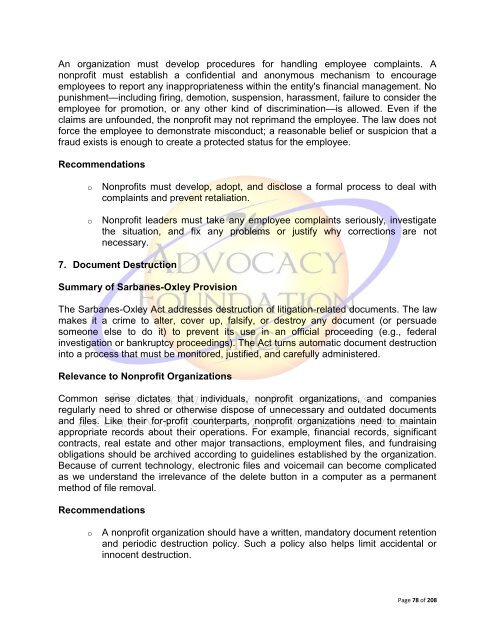The Sarbanes-Oxley Act of 2002
The Sarbanes-Oxley Act of 2002
The Sarbanes-Oxley Act of 2002
Create successful ePaper yourself
Turn your PDF publications into a flip-book with our unique Google optimized e-Paper software.
An organization must develop procedures for handling employee complaints. A<br />
nonpr<strong>of</strong>it must establish a confidential and anonymous mechanism to encourage<br />
employees to report any inappropriateness within the entity's financial management. No<br />
punishment—including firing, demotion, suspension, harassment, failure to consider the<br />
employee for promotion, or any other kind <strong>of</strong> discrimination—is allowed. Even if the<br />
claims are unfounded, the nonpr<strong>of</strong>it may not reprimand the employee. <strong>The</strong> law does not<br />
force the employee to demonstrate misconduct; a reasonable belief or suspicion that a<br />
fraud exists is enough to create a protected status for the employee.<br />
Recommendations<br />
o<br />
o<br />
Nonpr<strong>of</strong>its must develop, adopt, and disclose a formal process to deal with<br />
complaints and prevent retaliation.<br />
Nonpr<strong>of</strong>it leaders must take any employee complaints seriously, investigate<br />
the situation, and fix any problems or justify why corrections are not<br />
necessary.<br />
7. Document Destruction<br />
Summary <strong>of</strong> <strong>Sarbanes</strong>-<strong>Oxley</strong> Provision<br />
<strong>The</strong> <strong>Sarbanes</strong>-<strong>Oxley</strong> <strong>Act</strong> addresses destruction <strong>of</strong> litigation-related documents. <strong>The</strong> law<br />
makes it a crime to alter, cover up, falsify, or destroy any document (or persuade<br />
someone else to do it) to prevent its use in an <strong>of</strong>ficial proceeding (e.g., federal<br />
investigation or bankruptcy proceedings). <strong>The</strong> <strong>Act</strong> turns automatic document destruction<br />
into a process that must be monitored, justified, and carefully administered.<br />
Relevance to Nonpr<strong>of</strong>it Organizations<br />
Common sense dictates that individuals, nonpr<strong>of</strong>it organizations, and companies<br />
regularly need to shred or otherwise dispose <strong>of</strong> unnecessary and outdated documents<br />
and files. Like their for-pr<strong>of</strong>it counterparts, nonpr<strong>of</strong>it organizations need to maintain<br />
appropriate records about their operations. For example, financial records, significant<br />
contracts, real estate and other major transactions, employment files, and fundraising<br />
obligations should be archived according to guidelines established by the organization.<br />
Because <strong>of</strong> current technology, electronic files and voicemail can become complicated<br />
as we understand the irrelevance <strong>of</strong> the delete button in a computer as a permanent<br />
method <strong>of</strong> file removal.<br />
Recommendations<br />
o<br />
A nonpr<strong>of</strong>it organization should have a written, mandatory document retention<br />
and periodic destruction policy. Such a policy also helps limit accidental or<br />
innocent destruction.<br />
Page 78 <strong>of</strong> 208

















